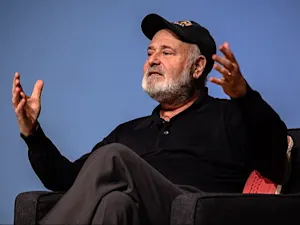
Terrifying Facts About the 'Son of Sam' You Need to Know
David Berkowitz Arrested August 10 1977. Photo by Vernun Argus press photographer. Public domain.
A new terror emerged in New York City in the 1970s that would leave an indelible mark on the city and its people. David Berkowitz, later infamously known as the "Son of Sam," unleashed a wave of violence that captivated the media and horrified the public. Over the span of a year, his brutal killings, bizarre confessions, and cryptic letters plunged the city into a state of paranoia and fear, changing the way people lived and thought about safety.
Who Was David Berkowitz?
Born Richard David Falco on June 1, 1953, Berkowitz came into the world under difficult circumstances. His biological mother, unable to care for him, gave him up for adoption days after his birth. Nathan and Pearl Berkowitz, a Jewish couple living in the Bronx, adopted him and gave him a seemingly stable upbringing. Despite their efforts, Berkowitz was often described as an unpredictable and troubled child. Teachers and neighbors noticed his violent tendencies, and classmates recalled his outbursts. He was also deeply affected by bullying and struggled with his identity as an adopted child.
The turning point came in 1967 when his adoptive mother, with whom he was close, passed away from breast cancer. This loss devastated Berkowitz, and his behavior grew more erratic. His adoptive father's remarriage and relocation to Florida deepened Berkowitz's sense of abandonment.
At 18, Berkowitz enlisted in the U.S. Army, where he served as a marksman in South Korea. Military life provided structure and discipline, but it did little to temper his darker urges. After being honorably discharged in 1974, Berkowitz returned to New York, working as a postal clerk and living in Yonkers. To most, he seemed like an unremarkable loner. But his journals, later discovered by police, revealed an obsession with fire and violence. He wrote of setting over 1,500 fires across the city during the mid-1970s.
The Descent Into Violence: The 'Son of Sam' Murders
Berkowitz's violent spree began on Christmas Eve 1975 when he stabbed a teenage girl with a hunting knife. Although she survived, the attack marked the start of his reign of terror. In July 1976, Berkowitz escalated to shootings, killing Donna Lauria and injuring her friend Jody Valenti as they sat in a parked car. Over the next year, Berkowitz attacked young couples across the city, targeting those in cars or walking late at night. His weapon of choice was a .44-caliber revolver, earning him the nickname the ".44-Caliber Killer" before he adopted the moniker "Son of Sam."
The randomness of the attacks baffled law enforcement. There seemed to be no clear motive, and the victims were spread across different boroughs, making it difficult to connect the crimes. This lack of clarity heightened the public's fear — anyone could be a target.
By March 1977, law enforcement knew they were dealing with a serial killer, but they had little else to go on. Tensions reached a boiling point when Berkowitz shot college student Virginia Voskerichian as she walked home in Queens.
A Killer's Calling Card: The Letters
Berkowitz wasn't content with simply committing crimes — he craved attention. After the killing of Valentina Suriani and Alexander Esau in April 1977, he left a note near the scene addressed to NYPD Captain Joseph Borrelli. In it, he introduced himself as the "Son of Sam" and taunted investigators with cryptic messages and disturbing declarations. The letter's tone was theatrical, filled with references to demons and dark forces. It also contained veiled threats of more violence, sparking a media frenzy.
Newspapers printed Berkowitz's letters, and the public became both terrified and fascinated by his words. The killer also reached out to columnist Jimmy Breslin, sending him a letter that was published in the New York Daily News. In it, Berkowitz warned, "Hello, from the gutters of New York. Don't think because you haven't heard from me for a while that I went to sleep. I am still here," as reported by Oxygen.
The Summer of Fear
By the summer of 1977, fear gripped New York City. Residents altered their routines — dark-haired women dyed their hair blond to avoid being targeted, and couples stayed away from parked cars. Businesses suffered as people avoided public spaces, and the city seemed to come to a standstill. Police resources were stretched thin, with over 300 officers assigned to the case. Still, the killer remained at large.
The final attack occurred on July 31, 1977, when Berkowitz shot and killed Stacy Moskowitz and severely injured Robert Violante in Brooklyn. This time, a witness noticed a suspicious man near a car that had received a parking ticket. This crucial detail would soon lead to Berkowitz's downfall.
The Arrest: A Break in the Case
Investigators traced the parking ticket to Berkowitz's vehicle, which was registered in Yonkers. On Aug. 10, 1977, police staked out his apartment. When Berkowitz emerged, they apprehended him without resistance. His first words reportedly were, "You got me," as reported by Oxygen. Inside his car, police found a .44 revolver and detailed maps of crime scenes.
Trial, Sentencing, and Legacy
In May 1978, Berkowitz pleaded guilty to all charges and received six consecutive life sentences. His trial brought closure to a city traumatized by his crimes but also raised questions about the media's role in sensationalizing the case. The "Son of Sam" law, which prevents criminals from profiting from their notoriety, was enacted as a direct response to his actions.
In the decades since his incarceration, Berkowitz has claimed to have found religion, referring to himself as the "Son of Hope" in his book, as reported by Biography.com. From behind bars, he has written letters apologizing for his crimes and participates in faith-based programs. While some view this as a genuine transformation, others remain skeptical.
A Lasting Impact
David Berkowitz's crimes left scars on New York City that are still felt today. His actions forever altered how the public perceives safety and the nature of random violence. The case also highlighted systemic flaws in mental health support and law enforcement coordination. For many, the fear and paranoia of the "Son of Sam" era serve as a grim reminder of how quickly normalcy can give way to chaos.
References: Who Is David Berkowitz, The 'Son Of Sam'? | David Berkowitz - Biography























